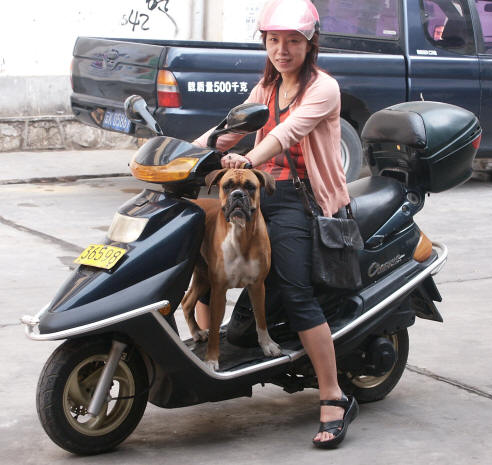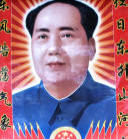Star Date: May 2006
Guangxi, Yunnan
Hello Dear Family & Friends!
Dou zao!
(Good Day – Dai ethnic minority greeting)
"Gentleness was considered "bourgeois"...Over the years of the Cultural Revolution, I was to witness people being attacked for saying "thank you" too often, which was branded as "bourgeois hypocrisy."
(Juang Chang, Chinese-born British writer and lecturer, "Wild Swans", worth reading)

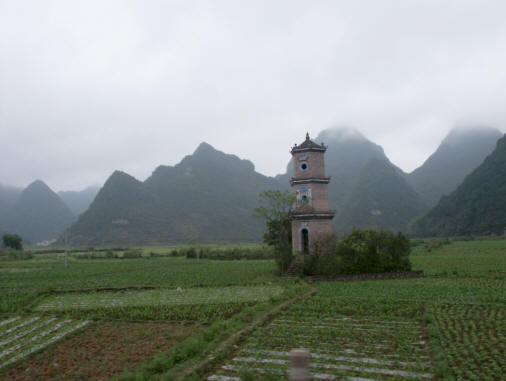
Mystical valley of mogotes between Ningming and Daxin.
The Chinese have Moxie! The Chinese people are strong survivors and their culture has adapted and changed through the ages, even surviving the Cultural Revolution. Most often what appears to be a simple lack of manners is just a difference of cultures. A mother yelling at her child is in fact a loving attentive parent. Their concept of noise, privacy and space is completely different from our experience. So would ours be if we had grown up with a large extended family noisily carrying on their daily life right next to the sleeping baby. This utilitarian nature allows for a person to talk (often loudly) if they have something to say, look (often stare) if they are curious, sleep wherever and whenever they are tired, and ignore the seemingly most outrageous situation, as if it wasn’t there. Gone are the endless apologies, understatements, explanations, subtle innuendos and excuses of the west. Just say it and move on. As shocking as this clash of cultures seems at times, once you figure out the swing of things, it can be quite refreshing.
After the ferry from Hainan Island we worked our way through western Guangxi. We soon were welcomed by more of the beautiful tall needle- like limestone mountains, of the Yangshuo area. These mogotes are one of the artistic magical images of China that linger in the minds of foreigners. We aimed for Ningming and the nearby little village of Panlong where we stayed in a Dong-style wooden room, serenaded by a quasi authentic ethnic music presentation, put on for some visiting Korean tourists.

Through the eyes of a child..
The only place to stay, it is worth putting up with an evening of tourists to spend the next day exploring the tiny cheery village, and the fields nestled amongst the mountains. The original homes were made of bamboo sticks covered with dried dung and the contrast with the modern nearby Cultural Village was startling. Taking the 2 hour boat ride through the mogotes to Hua Sha Bihua or Flower Mountain was a don’t miss add-on (only 40Y). It ends at a large 17m x 90m mural painted by the Luoyue ancestors 2000 years ago. All 20 excited, boisterous tourists wore themselves out going upriver and slept like babies, in every conceivable position, on the quiet, serene trip back down river.
Neighboring Hunan is full of pilgrimage sites honoring Mao Zedong and the birth of the Communist Party. At the early age of 16, a famine and subsequent uprising of starving peasants in Changsa, caught Mao’s attention. The son of a peasant, he realized that the oppressive feudal system of the Qing Dynasty must end, which it soon did following an army uprising led by Chiang Kaishek. After University in Beijing, influenced by Sun Yatsen, Mao started organizing communist activities.

Another effective rain hat. Nothing rains on that smile.

A Dong beauty on the boat ride up to Hua Shan Bihua. Behind are the 2000 year old rock paintings of the Luoyue people.
We looked at the map and leap-frogged our way from small town to small town following the borders of Vietnam then Laos as we entered Yunnan. Travelers simply never take these windy, slow back roads through southern Yunnan (the small local road from Ningming to Daxin was breathtaking) and we had ‘first contact’ after ‘first contact’ experience the whole time. Sleeping in small towns, ‘somewhere’??, we would hike the surrounding countryside past forgotten pagodas, through emerald rice terraces and on through tiny villages full of drop jaw stares. These looks of astonishment are always followed by greetings and the biggest smiles and laughter on the planet. We delighted in their reactions as they posed for their first ever photos and giggled with excitement as they watched themselves appear on the screen. We like to think that we added some excitement to their ordinary and often mundane day and that their first contact with a foreigner will give them something to talk about for sometime. Kind of like the quote from George Fox, founder of the Quakers, ” Walk cheerfully over the earth, answering that of God in everyone.” These genuine exchanges cross cultural boundaries and everyone communicates on that deeper level certain to break down fear and prejudice. They enjoyed the interaction as much as we did and we were quickly offered freshly prepared tea from the blackened kettle over the fire, fruit such as fresh papaya, plums, bananas, and several times back in the small towns they simply refused to take any money for cooking our vegetables for dinner. Of course out would come our family photos as we shared commonalities. They were just so excited to spend time with us and seemed honored that we happened into their lives. It also reinforces what we feel – Americans are creative, friendly, dynamic people. We love America, just can’t stand the current government and military policies. The Chinese seem to feel the same and the majority give us a thumbs up when we say we are from ‘Meiguo’.
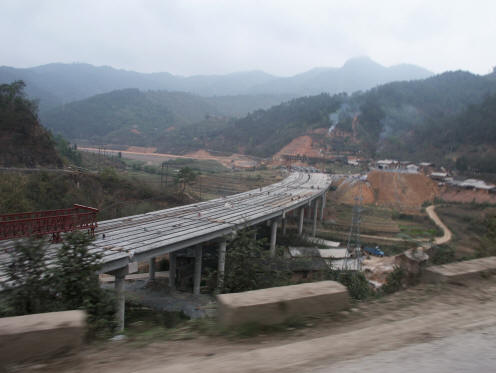
China is building some of the finest, new tech highways in the world.
The back roads of Yunnan are remote and at certain times of the year, such as the rainy season, often impassable. This is rapidly changing as large super highways are being constructed using the latest technology. Labor is still cheap and this boom has employed every interested citizen and given them a hand in expanding, improving, and building a modern country. Like the U.S. in the 1950’s, this country is opening up and paving the way for greater things to come. As we took a painfully slow 14 hour bus ride from Wenshan, Gejiu, to Simao we longingly gazed at the almost completed road running parallel. The new highway was destroying few villages and was in fact utilizing large spans of concrete to simply go right over them or nearby fields planted with crops. We stopped in one small village and literally loaded tons of tofu (well maybe 1000 pounds). Large metal containers of freshly made tofu were fit like gloves down the center aisle and the already cramped bus simply adapted around it. People very seldom complain and just simply stare in quiet resignation, waiting for events to unfold. We seldom complain either and often just watch and wait for what will happen next. Occasionally a tangled mess needs sorting out, such as a massive traffic jam that is remedied by one truck moving 4 feet to the side to allow everyone by while they do repairs. Or when our bus is fully loaded, it’s hot, and the driver is over on the side having a card game instead of leaving as scheduled, we may bring this to someone’s attention. The crowd loves watching a foreigner get involved and Joseph has a way of getting things happening, always followed with a big “Thank you.” Sometimes so many people are talking that no solutions are figured out. Sometimes the real delay is someone just stalling in hopes of extracting a little bribe money. Sometimes it is just a matter of getting away with what they can get away with. Human nature worldwide!

Out with the old and in with the new. Everywhere you look buildings are being torn down, mostly by hand. The only bummer is if you check into a hotel in the evening, only to find out at 8am the next morning, that the top floor of your building is being demolished brick by brick. Time to move!
Once again, like the 1950’s and 60’s in the U.S., every man who is a man in China smokes! (By the way the smoking icon of that era, the Marlboro Man, died of lung cancer!) This mass light up isn’t the occasional bong full of mountain tobacco like in the villages of old but a non stop chain of blue obnoxious cigarette smoke. China has become an ashtray. Behind the times pollution policies for factory emissions and increasing vehicle pollution has sent China hurdling toward health and environmental disaster. International business has forced improvements in human rights issues and possibly tourism will be the precursor of change in these deadly health issues. The increase in emphysema, respiratory infections and lung cancer (of family members also) may finally have caught the eye of the powers that be. Many public areas, buses, and trains have one of our favorite signs: NO SMOKING! It is common for a group of smokers to sit under one of these large signs puffing away. Why is it then that all of the buses, train compartments, or waiting rooms in which we spend any length of time, are all smoke free?? Enter, ‘ta dah’, ‘ The Extinguisher’, the name given to Joseph by two grateful non smoking students sharing our bus. This simple technique was developed through desperation and in the name of health survival. When someone walks on a bus, let’s say, with a cigarette lit, Joseph will simply say, “Mei you, Please No Smoking!!”, while pointing to the often present sign. The polite Chinese look startled, often apologizes profusely, and always puts it out. This is followed by us loudly saying, “Xie xie, thank you, thank you.” After several brief encounters the whole bus or room catches on and the rest of the trip is smoke free. There may be a few more rest stops so the nicotine monkey can be fed, but all the better for us – more pee breaks!

The inside of a typical, new concrete house in a rural area. Such simple surroundings and limited possessions. These new fangled places are never finished past the utilitarian phase and usually replace construction such as bamboo or dung over sticks, like those near Panlong.
What we noticed right away is that all the silent suffering women in the bus and the non smoking males are overjoyed, very thankful and start self patrolling the situation. Maybe there is hope for the hundredth monkey theory yet. Now it has become a challenge and we think nothing of standing up in front of a full ferry of 200 people as they make their announcements and cheerfully saying “Nihao”, (“Hello!”) and pointing to the large No Smoking sign. Then pointing to the door and reminding the surprised crowd that they are welcome to step outside and smoke. A rousing xie xie, or thank you completes the deal and 60% of the crowd, the non smokers, have a pleasant smoke free ride. The grateful smiles lighting up the room make it all worthwhile. Surprisingly some of the most obnoxious encounters have been with Europeans exercising their right to an early death. Their choice – just do it away from our air!! Sure glad we’ve already been through this boring dance in most of the west. Hopefully some of these relieved Chinese nonsmokers will carry on in the footsteps of “The Extinguisher.” Our Chinese student friends suggested maybe a video game or action figures would be coming on the market. As we like to say, “Whatever works.”
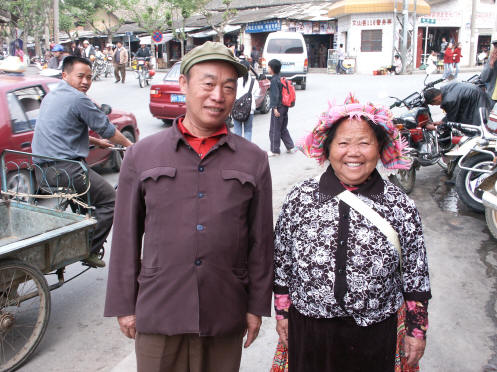
Off to the market.
We spent several days in the only modern city and capitol of the region, Jinghong. Met by an older Chinese woman at the bus station we followed her home to a basic little guesthouse (30Y=$3.75), down a maze of side alleys. We always make sure to get a business card or at least the phone number when we check in. We literally have no idea the name of most of the hotels we stay in and it is easy to get confused when all of the street names are in Chinese. Also in many places in Xishuangbanna even Mandarin isn’t spoken, just local dialects. This proved invaluable once again as we ended up next to the wrong bus station late at night, and once we found Bus Station #2, we were directed down the correct dark alley in search of our home. China is very safe and the only ‘problem’ you have down these alleys is having to say hello to all the curious people lining the street. In specific areas of most countries walking down dark alleys at night isn’t a smart idea. Our hostess was waiting for us and welcomed us warmly. Joseph, with his gemologist’s loop in tow and reminiscing about business trips dealing with large rubies, jade and the King of Burma, had fun looking through the Burmese Jade Market. Warning: you usually aren’t getting the quality you are promised so buy what you like and if you don’t pay too much there is no harm done. Leave the expensive pieces for the experts. We saw the same piece for 30Y marked up to 1250Y just a few stalls down. We went in search of the Mei Mei Cafe and felt shocked, just like locals, when we saw all the foreigners. Many travelers go from backpacker place, to cafe, to backpacker place and then take arranged tours from these centers. A different experience and less threatening I guess, but far from authentic. Nothing replaces hanging out with the locals for days on end, getting to know them on a deeper level. Limited travel time, a factor we luckily don’t have to consider except for weather, often dictates such a pattern of travel. Loving other cultures instead of fearing them is also a factor. Hey, they are just like us deep down. They just got wrapped in a different package! That aside, it’s hard to imagine becoming isolated in a country of 1.6 billion people but having the chance to share ideas and swap stories with other westerners was a treat. We had a relaxed evening just hanging out and talking to travelers from Australia, Germany, France, Holland, & Canada. Cheers!
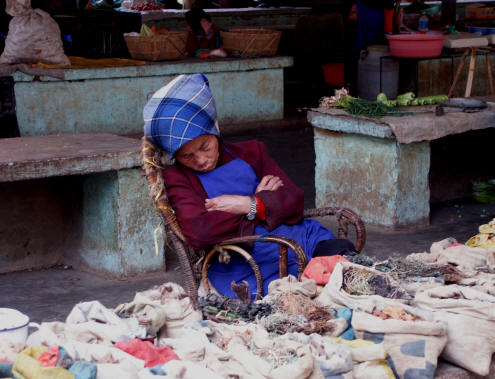
Every market has stalls of wild traditional herbs; to make teas that cure whatever ails you. We bought ginseng from a farmer who had 500 lbs of it drying in the sun.

Close encounter of the fun kind! If you see someone without a smile give him one of yours.
And so it goes…………………………………………………..Next the ethnic diversity of Yunnan. Until then Keep Smiling and Thank You for keeping in touch. (pardon the “bourgeois hypocrisy”). It’s always great when you drop a line from your corner of the planet. Take care.
Love, xoxoox Nancy & Joseph
Travel notes:
$1.00US = 8 Yuan
Mengyang: New friendly hotel next to the bus station (50Y).

